 |
| Home Trade's Agarwal: He had a fool-proof
scheme with G-secs |
SANJAY AGARWAL
Victim Or The Crime?
Home Trade CEO Agarwal made the news
in 2002, for all the wrong reasons.
Now out on bail
and awaiting trial, Sanjay Agarwal continues to be one of 2002's
enduring mysteries. Baby-faced Agarwal, a MBA from Bombay Univ with
dollar dreams in his eyes was an employee of Lloyds Securities,
who bought the firm from the Gupta family that ran Lloyds when it
wished to exit the business. Renamed Euro Discovery Technology Ventures
first, and Home Trade next, the company entered the hyped up online
securities trading business. Its ads, featuring Shah Rukh Khan,
Sachin Tendulkar, and Hrithik Roshan created a stir, but business
was slow. Which is where things begin to get murky. Agarwal had
inducted an acquaintance from his Lloyds days, broker Ketan Sheth
as a director on the board of Home Trade. At Sheth's prompting-the
man dealt in government securities, G-secs-or on his own accord,
Agarwal decided to get into g-sec trading. With a twist. The company
would approach smaller co-operative banks or provident funds, look
for a weak link such as a venal chairman, strike a deal with him,
sell the bank or fund some G-secs, delay delivery, and, play the
stockmarket using the money in the intervening period. Unfortunately,
the market tanked, the company could not recoup its investments
from the market to buy G-secs and deliver them. The scam came to
light when a NABARD team inspecting the accounts of Nagpur District
Central Co-operative Bank noticed that the bank had made huge investments
in G-secs it didn't possess. Its chairman Sunil Kedar, it later
emerged, was in with the Agarwal-Sheth duo all along. Some of Agarwal's
former colleagues spoke out about his inability to orchestrate a
scheme such as this; he wasn't, they claimed, smart enough. Victim
or the crime, though, Agarwal, who was fond of the good things in
life, saw everything go up in smoke in 2002.
-Shilpa Nayak
RAM NAIK
His Luddite Lordship
Petroleum Minister Naik almost killed
the disinvestment process.
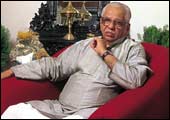 |
| Petroleum Minister Naik: Nay-sayer |
To 68-year-old
Ram Naik, the union Petroleum Minister must go credit for stalling
the government's privatisation process in its steps. Until he met
Naik, the immovable object, Union Disinvestment Minister Arun Shourie
had acquired a reputation as a unstoppable force. His plan to raise
Rs 51,300 crore for the government from the disinvestment process
in 2002-03 seemed achievable.
The Petroleum Minister has always been against
the privatisation of public sector oil companies. In 1999 he declared
them "strategic" and pushed a cross-holding proposal through
Parliament-Indian Oil Corporation and ONGC picked up a 10 per cent
share in each other, enriching the government's coffers, and assuaging
any privatisation pangs it may have felt. In February 2002, he got
IOC to bid almost double what the next highest bidder did to pick
up IBP. Now he claims his opposition stems from the fact that public
sector companies were funded by the public; ergo, he says, its benefits
have to accrue to them. While the government has respected Naik's
wishes-BPCL will be 'privatised' by selling its shares to the public-his
victory isn't total. PSU oil major HPCL will go to the highest bidder.
Even Luddites have limits.
-Ashish Gupta
 |
| Dhirubhai Ambani: A dream called Reliance |
DHIRUBHAI AMBANI
Passing Of The Patriarch
Dhirubhai Ambani: 1932-2002
On December 28,
the late Dhirubhai Ambani's 70th birth anniversary, the conglomerate
the man founded launched its telecom service across the country-the
biggest telecom launch India has seen. The scale of that launch
was befitting of the Rs 65,000-crore Reliance Industries (Reliance
Infocomm is a subsidiary). And the choice of the date was fitting
too: wasn't it Dhirubhai Ambani, a school teacher's son from Chorwad
who started it all? A hero on D-street, Ambani died on July 6, 2002,
leaving behind a company that will almost certainly stand the test
of time.
-Roshni Jayakar
 |
| M.S. Oberoi: Te father of hospitality |
M.S. OBEROI
Goodbye Mr. Hospitality
Rai Bahadur Mohan Singh Oberoi: 1898-2002
The man who gave
his name to a global hotel chain began his career in hospitality
as an employee of The Cecil Hotel, Shimla. Twenty one years on,
he owned the place, having acquired it from its previous owner,
Ernest Clarke. And by the time he died, on May 2, 2002, he had grown
it into a 37 hotel, 27 location (across seven countries, if you
must know), Rs 750-crore empire. M.S. Oberoi hadn't been involved
with his business for some time-his son P.R.S. 'Biki' Oberoi had
taken over the reins in the late seventies. But his name, and the
culture he fostered will prevail in the hotel chain he founded.
-Moinak Mitra
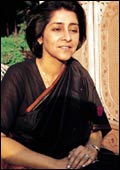 |
| HSBC's Kidwai: In the thick of action |
NAINA LAL KIDWAI
India's Most Powerful Woman
HSBC has a new rainmaker, Vice Chairman
Kidwai.
Arguably the best-known
Indian investment banker abroad, Kidwai moved from JM Morgan Stanley,
where she was Vice Chairman, to HSBC as head of its investment banking
operation. The first Indian woman to graduate from Harvard Business
School can thank Fortune magazine for that-she has been a regular
in its listings of the most powerful women in business. The 45-year-old
Kidwai caught the public eye when she joined Morgan Stanley in 1994.
She helped the firm forge a joint venture with Nimesh Kampani's
JM Financial, and together, the duo grew the investment bank into
the country's biggest. An expert in IPOs and M&As, Kidwai helped
the bank rope in Wipro, Infosys, and Bharti as clients, and facilitated
the Birla-Tata-AT&T cellular deal. HSBC must be hoping she can
repeat that.
-Seema Shukla
 |
| Aamir Khan: The world is not enough |
AAMIR KHAN
Can-do Attitude
India goes to the Oscars, thanks to the
Khan.
Warhol was wrong.
Fame doesn't always come in 15-minute packages; for actor Aamir
Khan it came in a 222 minute one. That's the length of his home
production Lagaan (Tax). Set in pre-independence India, the motion
pic has a group of villagers taking on a British XI in a cricket
match. The deal: if they win, they do not pay any tax for three
years; and if they lose, they pay thrice as much. Improbable as
the plot sounds, it struck a chord with masses in India and critics
abroad, and managed to win an Oscar nomination in the non-English
language category, a first for an Indian motion pic. It didn't win,
but by then the world had discovered Bollywood.
-Shilpa Nayak
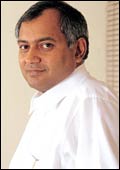 |
| TVS Motor's Srinivasan: V for victory |
VENU SRINIVASAN
Riding High
Thanks to Deming and Victor, it's victory all
the way for Srinivasan.
Automotive CEOs
are known to long for a year when they make a spectacular launch
and win some kind of an award too. For TVS Motor's Venu Srinivasan,
the wait has proved surprisingly short. In 2002, the 49-year-old
CEO saw his newly launched four-stroke, 110-cc motorcycle, the Victor,
effect a definite turnaround at his company, which on May 1, 2002
formally ended its joint venture with Suzuki. While Victor's booming
sales is certainly something to cheer about, what must have added
to Srinivasan's pride is the fact that the Victor was completely
designed and developed in-house. Then, 2002 also saw TVS Motor win
the prestigious Deming Prize for quality. Not just that, Sundaram-Clayton,
Srinivasan's other company that already won the Deming Prize in
1998, went on to win the exclusive Japan Quality Medal-a club open
only to the Deming winners. The problem with a busy year like Srinivasan's:
2003 may look pale in comparison-unless, of course, TVS Motor launches
more victors.
-R. Sridharan
AZIM PREMJI
The Quiet Invader
Wipro's Azim Premji was the software
domain's #1 raider in 2002.
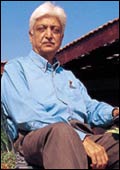 |
| Wipro's Premji: M&A time |
He has got Rs 1,400
crore in his war chest and he is hungrier than ever. In the first
nine months of 2002-03, Azim Premji's Wipro has acquired four companies-Rs
584 crore has gone into three, and due-diligence work is on for
the fourth. In July, Wipro acquired Spectramind, India's biggest
independent call centre for $90 million (Rs 432 crore) in an all-cash
deal; in July, it snapped up GE Medical Systems it Pvt Ltd, for
$5.73 million (Rs 27.5 crore); and in November, it acquired the
energy management practice of American Management Systems for $26
million (Rs 124.8 crore). While the company has announced the acquisition
of the R&D division of Ericsson, the valuation process is still
not complete. India's software nobility-Wipro, Infosys, HCL Tech-has
been talking the M&A language for some time now, but Premji's
sudden burst of acquisitions in 2002 seems to have given it a clear
edge over the competition. Clearly, Talk softly, but wield a big
wallet is the man's motto.
-Venkatesha Babu
ARUN JAIN
Hostage Situation
Polaris' Arun Jain's earned the dubious
distinction of being the first Indian CEO to be held hostage in
an alien territory.
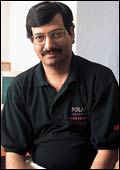 |
| Polaris' Arun Jain: In deep soup |
For Arun Jain,
2002 should have gone down in history as the year when he pulled
off one of the biggest mergers (of Polaris with Citigroup's OrbiTech)
in it services. Instead, a fateful November trip to a customer in
Jakarta earned him a bizzare distinction. He became the first Indian
CEO to be held hostage in an alien territory, that too by a pin-striped
customer. It took top-level ministerial intervention to win his
release. Just what happened? In June 2002, Jain's Polaris Software
Lab signed a $1.3-million (Rs 6.24 crore) contract with Bank Artha
Graha of Indonesia to implement its Bancware suite of software solutions.
According to Polaris, the company started implementation work in
August, but Artha Graha was unhappy and decided to cancel the contract
in November, although the completion was due only in July 2003.
Polaris says it contested the termination on the grounds that it
was incorrect, and wanted to negotiate with the bank (there was
a provision for arbitration in Singapore). Jain had arrived for
the negotiations, when the bank decided to have him arrested. After
12 harrowing days, during which the vegetarian Jain had his and
his colleague Rajiv Malhotra's passports taken away by Indonesian
police, he returned to India, shaken but safe. The legal battle
is on, but Polaris now plans to be more choosy about its customers.
-R. Sridharan
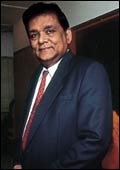 |
| A.M. Naik: Suddenly, the job gets tough |
A.M. NAIK
Testing Times
CEO Naik had to tread the fine line between
the big and the small investors.
Takeover battles
are never easy, but the one A.M. Naik was pitched into last year
was particularly awkward. Consider this: For almost three years,
Naik-CEO of the Rs 8,358-crore L&T-had been trying to demerge
its cement division. In November 2001, the Ambanis of Reliance sold
their 10.5 per cent stake in L&T to the A.V. Birla Group. A
simple transaction, except that when the Birlas followed it up with
an open offer for an extra 20 per cent of L&T, investors cried
foul and SEBI stepped in. Investors were miffed that the Birlas
were offering them only Rs 190 per share versus the Rs 306 they
paid the Ambanis. SEBI, on its part, alleged that the Birlas-who
get 30 per cent of the cement market with L&T-had stalled the
demerger, which implied management control. How is Naik going to
cope? We'll find out this year.
BILL GATES
Big On India
William H. Gates-anything to conquer.
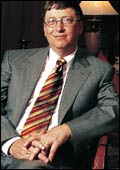 |
| Microsoft's Gates: He needs India |
No one could have
missed microsoft chairman and Chief Software Architect Bill Gates'
four-day visit to India in November. He was everywhere-in the general
papers; in the business papers; in vernacular publications; on the
tube. If software is India's enduring obsession-it is-then Gates
is its presiding deity. One day of the visit, the first, was dedicated
to charity-Gates announced that the Bill & Melinda Gates Foundation
would be spending around $100 million (Rs 480 crore) to help India
fight the aids menace. The remaining three days were dedicated to
business: meeting politicos who mattered, including a couple of
Chief Ministers and the President; talking to CEOs about how technology,
in general, and Microsoft, in particular could help their businesses;
meeting with employees and customers; and playing the evangelist
with the developing community, key to the company's continued dominance.
If the visit had one overarching leitmotif, it must have been the
importance of India to Microsoft. The country's huge developing
community has a role to play in the acceptance of the company's
.Net platform. Indian software services biggies like Wipro and Infosys
could, by building applications and solutions on Microsoft's platforms,
spread the Redmond giant's franchise. And the Indian government
could, when it decides to it-enable itself, become the single largest
customer, of any kind of technology product or service-one reason
why Microsoft is open to sharing the Windows source code, a practice
reserved for its biggest customers, with the government. Seen in
the light of all these, the $500-million (Rs 2,400 crore) investment
that Gates announced looks like chump change.
|

